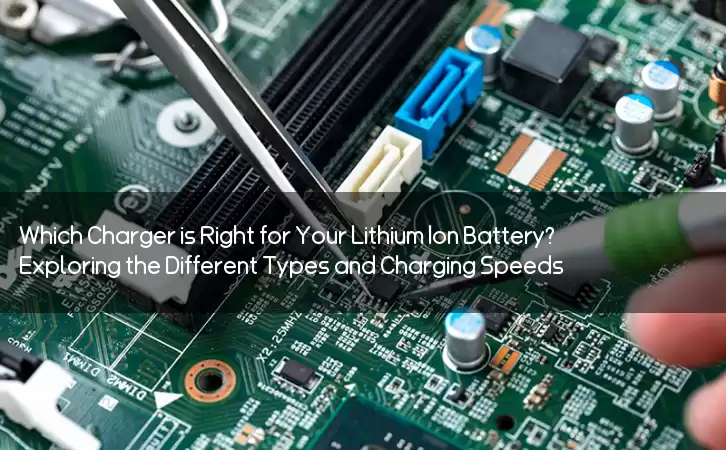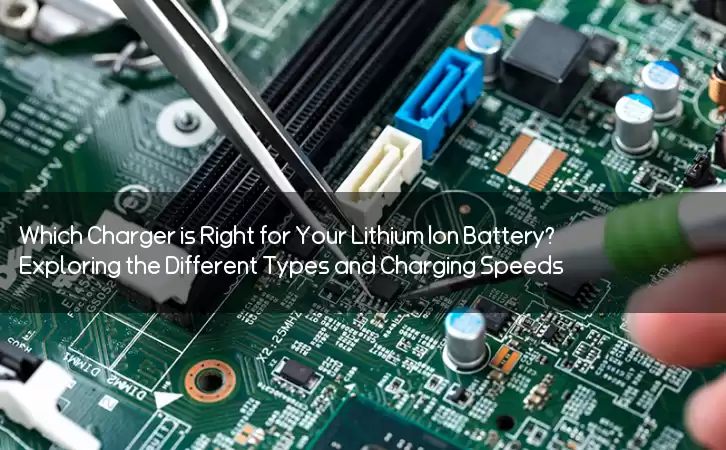Information Center
Which Charger is Right for Your Lithium Ion Battery? Exploring the Different Types and Charging Speeds
Published:2023-07-25 20:34:58 Author:Green WCND Views:93Lithium ion batteries have become an essential source of energy in our daily lives. They power everything from our smartphones and laptops to electric cars and e-bikes. However, not all chargers are created equal when it comes to charging lithium ion batteries. In this article, we will explore what chargers work with these powerful batteries and why it matters.

Firstly, it is important to understand what a lithium ion battery is and how it differs from other types of batteries. Unlike traditional rechargeable batteries like nickel-cadmium (NiCd) or lead-acid batteries, lithium ion batteries are more lightweight and have a higher energy density. This allows them to store more energy in a smaller space and deliver more power for longer periods of time.

When it comes to charging lithium ion batteries, there are a few types of chargers available on the market. The most common ones are USB chargers, wall chargers, and car chargers. Each of these chargers are designed to work with lithium ion batteries, but they have different features and charging speeds.
USB chargers are the most popular chargers for small electronic devices like smartphones and tablets. They provide a low ampere output (typically under 2 amps) and are designed to charge the device slowly over a longer period of time. This is because lithium ion batteries cannot handle rapid charging and can be damaged if charged too quickly. USB chargers are also convenient because they can be plugged into a computer or power bank for charging on-the-go.
Wall chargers are a step up from USB chargers in terms of charging speed. They typically offer a higher ampere output (3 amps or more) and can charge devices like laptops and cameras faster than USB chargers. However, it is important to note that some wall chargers may not work with certain devices that have specific charging requirements. For example, some laptops require a higher voltage charger that is not compatible with a standard wall charger.
Car chargers are designed to charge electronic devices in a vehicle, usually through the car’s cigarette lighter plug. They offer a similar charging speed to USB chargers and are ideal for charging smartphones, tablets, and GPS devices during long road trips. However, some car chargers may not be compatible with certain devices and may not deliver enough power to charge larger devices like laptops.
In addition to these types of chargers, there are also universal chargers available that can work with a variety of devices and battery types. These chargers typically offer a high ampere output and can charge devices quickly, but they can also be expensive and may not be necessary for everyday use.
In conclusion, there are many chargers available that work with lithium ion batteries, but it is important to choose the right one for your specific device and needs. USB chargers are great for small electronic devices, while wall chargers and car chargers offer faster charging speeds for larger devices. When choosing a charger, make sure to check the device’s charging requirements and choose a charger that is compatible with those requirements. By using the right charger, you can ensure that your lithium ion battery remains healthy and extends its lifespan.
Power Adapter Design and Customization Guide for Portable Electric KettlesI. Common Design Types for Portable Electric Kettle Power AdaptersPortable electric ke···
I. Common Design Types of Power Adapters External Independent Type (Most Common) Design: A standalone adapter (e.g., "black brick") connected to the p···
Handheld Vacuum Cleaner Power Adapter Selection GuideIntroductionHandheld vacuum cleaners have become a mainstream tool for household cleaning due to their port···
Drill Power Adapter Selection Guide.drill-container { font-family: Arial, sans-serif; line-height: 1.6; max-width: 800px; margin: 0 auto; padding: 20px; } .dril···





